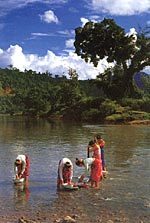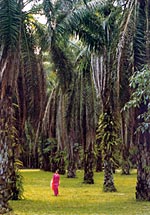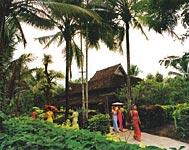|
 In the southwest of China and at the southern most
tip of Yunnan Province, there is a picturesque, fertile and
mysterious land - Xishuangbanan. In the Dai language, "xishuang"
is "twelve" and "banna" is "one thousand pieces of land", thus "Xishuangbanna"
can be directly translated into "twelve thousand pieces of land".
As a matter of fact, it refers to the twelve regions that are
under its administration. With Myanmar to the southwest and Laos
to the southeast, Xishuangbanna has a boundary line of 1,069
kilometers. In the southwest of China and at the southern most
tip of Yunnan Province, there is a picturesque, fertile and
mysterious land - Xishuangbanan. In the Dai language, "xishuang"
is "twelve" and "banna" is "one thousand pieces of land", thus "Xishuangbanna"
can be directly translated into "twelve thousand pieces of land".
As a matter of fact, it refers to the twelve regions that are
under its administration. With Myanmar to the southwest and Laos
to the southeast, Xishuangbanna has a boundary line of 1,069
kilometers.
Covering an area of 19,700 square kilometers,
Xishuangbanna Dai Autonomous Prefecture is composed of one
municipality and two counties. The highest point in the region is
2,429  meters above sea level whereas the lowest is only 477
meters. Dominated by a tropical rainforest climate, the average
temperature of Xishuangbanna is 21°C. meters above sea level whereas the lowest is only 477
meters. Dominated by a tropical rainforest climate, the average
temperature of Xishuangbanna is 21°C.
The capital of Xishuangbanna Prefecture is "Jinghong",
which means "the City of Dawn" in the Dai language. It is 692 km
from Kunming. There are more than ten nationalities including the
Dai, the Hani, the Jinuo and the Bulang, etc in its land. There
live over 5,000 species of plants and hundreds kinds of rare and
valuable birds and animals in its 20,000 square kilometers
tropical virgin forest, thus Xishuangbanna is noted as "the
Kingdom of Plants and Animals" and "An Emerald on the Tropic of
Cancer".
The Dai people is good at singing and dancing and
believes in the Buddhism, the
 Buddhism temples are scattering over
every village. The village of the Dais mostly builds by the water,
circling with bamboo fence and covering with the fruit trees, so
as to set up the independent courtyard one by one. The
Water-Splashing Festival, namely the New Year's Day by the Dai
calendar will be celebrated every year in the 6th month of Dai
calendar (on April 13 - 15 by the solar calendar). The rich and
colorful activities attract numerous tourists from home and
abroad. Buddhism temples are scattering over
every village. The village of the Dais mostly builds by the water,
circling with bamboo fence and covering with the fruit trees, so
as to set up the independent courtyard one by one. The
Water-Splashing Festival, namely the New Year's Day by the Dai
calendar will be celebrated every year in the 6th month of Dai
calendar (on April 13 - 15 by the solar calendar). The rich and
colorful activities attract numerous tourists from home and
abroad.
|